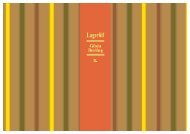- Page 4 and 5: perfume. The Continental shouts "Hy
- Page 6 and 7: demoniac as Nora had been fancying
- Page 8 and 9: Damn it, I won't have it!" Stevens
- Page 10 and 11: continued Lottie with the self-comp
- Page 12 and 13: All those questions seemed to Purit
- Page 14 and 15: They were now in the business part
- Page 16 and 17: CHAPTER IIITHE telephone was downst
- Page 18 and 19: She moved toward the door. She saw
- Page 20 and 21: said to herself. "It's foolish for
- Page 22 and 23: "But you know he can't keep away fr
- Page 24 and 25: She blushed deeply, happily. Her be
- Page 26 and 27: sweetest voice, "Yes-tomorrow eveni
- Page 28 and 29: Ruth, still more uneasy, turned bac
- Page 31 and 32: the laws of nature-yes, hers would
- Page 33 and 34: easy swaying of the baby sapling in
- Page 35 and 36: She folded her nightgown neatly abo
- Page 37 and 38: soon. But this is all nonsense. You
- Page 39 and 40: a faint benign light upon hills and
- Page 41 and 42: "About eight-maybe half-past seven.
- Page 43 and 44: "What elegant breakfasts they do se
- Page 45 and 46: "Don't be afraid. Aunt Kate ain't s
- Page 47 and 48: torn and dirty rag carpet. The odor
- Page 49 and 50: CHAPTER VIIIAT the threshold her bu
- Page 51 and 52: Susan shook her head."I suppose," h
- Page 53 and 54:
associate with. She rose and follow
- Page 55 and 56:
the two plates she had laid. "I see
- Page 57 and 58:
corn. The window through which she
- Page 59 and 60:
"And it doesn't much matter," sneer
- Page 61 and 62:
cookery.The mare set out. Susan's g
- Page 63 and 64:
looking at the interior. The lower
- Page 65 and 66:
CHAPTER XLATE that afternoon Jeb re
- Page 67 and 68:
oad southeastward on the left. That
- Page 69 and 70:
came upon a flat surface where soil
- Page 71 and 72:
cell. Surely she would run no risk
- Page 73 and 74:
for she was not looking at him, but
- Page 75 and 76:
The girl shuddered. "Yes," she answ
- Page 77 and 78:
"Before what?" His silence set her
- Page 79 and 80:
And without hesitation she began on
- Page 81 and 82:
face like that of a fallen and diss
- Page 83 and 84:
thought of her by those of whom she
- Page 85 and 86:
CHAPTER XIIIWOMAN'S worktable, a ro
- Page 87 and 88:
ack, while the three women sat in d
- Page 89 and 90:
second is, don't sell your body to
- Page 91 and 92:
jauntily switching her great hips a
- Page 93 and 94:
egan to pose. And it was hardly thr
- Page 95 and 96:
to get you on." He looked round cas
- Page 97 and 98:
"Not so very far," said the girl. "
- Page 99 and 100:
she was ready to try again. When sh
- Page 101 and 102:
She lifted her head. "Did I do very
- Page 103 and 104:
her a good foundation to stand on.
- Page 105 and 106:
"He'll be back in a few minutes," r
- Page 107 and 108:
worn without ironing. Her new hat w
- Page 109 and 110:
the world. "They think I'm dead," s
- Page 111 and 112:
"Oh-a great deal enough.""You must
- Page 113 and 114:
accepted, she hoped that, if he wer
- Page 115 and 116:
door behind him. Through the crack
- Page 117 and 118:
that's why I'll never get rich. Any
- Page 119 and 120:
wandered on-through the labyrinth o
- Page 121 and 122:
whenever he could make opportunity.
- Page 123 and 124:
epulsive body-the contemptuous old
- Page 125 and 126:
"No, thank you," she said."I'll go
- Page 127 and 128:
delightful smile of hunger about to
- Page 129 and 130:
succeeded by the dawn of waking bir
- Page 132 and 133:
down on-though Lord knows it's hard
- Page 134 and 135:
"You'll try living with us?""If you
- Page 136 and 137:
dress and surroundings from books a
- Page 138 and 139:
and Sunday nights. She read in the
- Page 140 and 141:
off. They were such a multitude tha
- Page 142 and 143:
manufacturer. "Now, Lorny, you ough
- Page 144 and 145:
house life; so old Tom was sleeping
- Page 146 and 147:
explained the situation, got Ashbel
- Page 148 and 149:
egan to be annoyed by Ashbel. In hi
- Page 150 and 151:
no means sure that the reproach in
- Page 152 and 153:
lows, such as are commonplace enoug
- Page 154 and 155:
procurers for the pavement and the
- Page 156 and 157:
makes me crazy!"Susan gave a disdai
- Page 158 and 159:
"You don't know," said Susan. "Didn
- Page 160 and 161:
our restaurant burned.""I never tas
- Page 162 and 163:
"Don't say things you don't believe
- Page 164 and 165:
"Thank you," said Susan to John."Th
- Page 166 and 167:
into my head to say I was ashamed o
- Page 168 and 169:
"Do you think I can marry him?""If
- Page 170 and 171:
And I can't play you a mean trick.
- Page 172 and 173:
had left it, a small-town girl with
- Page 174 and 175:
crossing Fourth Street and ascendin
- Page 176 and 177:
me that.""Who's he?""That's a long
- Page 178 and 179:
"Well-it's where the devils have be
- Page 180 and 181:
She had no disposition to inquire c
- Page 182 and 183:
civilized world. It was not quite d
- Page 184 and 185:
find out all about it. Maybe some o
- Page 186 and 187:
As for herself-she had, through lov
- Page 188 and 189:
life. In this world, to understand
- Page 190 and 191:
quietly to look for work and to fit
- Page 192 and 193:
expressing itself. If so, jealousy
- Page 194 and 195:
seeing a defect in themselves as a
- Page 196 and 197:
that enough?""You are very differen
- Page 198 and 199:
If Susan had been of the suspicious
- Page 200 and 201:
"Kiss me," she said, in her usual s
- Page 202 and 203:
SUSAN LENOX: HER FALL AND RISEbyDav
- Page 204 and 205:
them. I see now why they are printe
- Page 206 and 207:
inheritance of some bleaching and b
- Page 208 and 209:
see all-all that was there, all tha
- Page 210 and 211:
CHAPTER IIELLEN, the maid, slept ac
- Page 212 and 213:
the kind I'd be crazy about if I wa
- Page 214 and 215:
finery."Why, you've got a model fig
- Page 216 and 217:
the crown and a third, not so long,
- Page 218 and 219:
his brain. "Do you know, I've a sor
- Page 220 and 221:
ones lock away their best asset; th
- Page 222 and 223:
CHAPTER IIIAT the lunch hour the ne
- Page 224 and 225:
were exploring the openings in her
- Page 226 and 227:
occupy you-and I'll foot the bills
- Page 228 and 229:
never had the inclination, apparent
- Page 230 and 231:
servants and automobiles and cultur
- Page 232 and 233:
agencies, masquerading in the newsp
- Page 234 and 235:
appeared. Her face was so beaming b
- Page 236 and 237:
them off more effectively the sides
- Page 238 and 239:
to revolt.Perhaps it was the wind-y
- Page 240 and 241:
they're out of style. I can't give
- Page 242 and 243:
"No," was the reply. "He's gone to
- Page 244 and 245:
argain she could, not waste time in
- Page 246 and 247:
Tucker lying alive. Susan could see
- Page 248 and 249:
objected Ida. "You eat with me in m
- Page 250 and 251:
After a pause, Ida went on: "If a g
- Page 252 and 253:
egulars: "He's a nice fellow-knows
- Page 254 and 255:
ack." He laughed at her expression.
- Page 256 and 257:
drank enough to blunt any refinemen
- Page 258 and 259:
upon the pale, laughing lips. His e
- Page 260 and 261:
inspecting her bruises. "Now, I'll
- Page 262 and 263:
from where she and Rod had lived. N
- Page 264 and 265:
and was leaning on his stiff arms.
- Page 266 and 267:
scream?" she cried."Stand out of th
- Page 268 and 269:
CHAPTER VIIBUT she did not "look ou
- Page 270 and 271:
combination seemed somehow to tell
- Page 272 and 273:
"As you please," said Susan indiffe
- Page 274 and 275:
a thousand imitators and copiers, a
- Page 276 and 277:
every class of society whenever edu
- Page 278 and 279:
"I've been drinking myself, but I'v
- Page 280 and 281:
gift some worthless trifle from the
- Page 282 and 283:
clinging to youth which among the l
- Page 284 and 285:
never in the most favorable circums
- Page 286 and 287:
"Didn't you run away from home with
- Page 288 and 289:
sight and smell. She halted at the
- Page 290 and 291:
epaired. She had worn away from For
- Page 292 and 293:
get some notion of the tune.She had
- Page 294 and 295:
advances; she could not even go so
- Page 296 and 297:
saloon of the tenement quarter that
- Page 298 and 299:
offered again and again-she could s
- Page 300 and 301:
capricious though she was with her
- Page 302 and 303:
white of old ivory. Her thinness to
- Page 304 and 305:
shame to the black floor of the slu
- Page 306 and 307:
CHAPTER XISHE fell asleep, her head
- Page 308 and 309:
whiskey-a large drink. He sat up, s
- Page 310 and 311:
Einstein understood their expressio
- Page 312 and 313:
thing was clawing and growling and
- Page 314 and 315:
And when Roderick should be well, a
- Page 316 and 317:
She left the elevated and walked ea
- Page 318 and 319:
summer material like linen. He was
- Page 320 and 321:
career. What I'm interested to find
- Page 322 and 323:
handsome face, so full of life and
- Page 324 and 325:
in Delancey Street at half-past fiv
- Page 326 and 327:
hospital. So long!""How about this
- Page 328 and 329:
the simple, elemental story of a pe
- Page 330 and 331:
cover them-fighting each other. And
- Page 332 and 333:
fallen in the mud-or has been pushe
- Page 334 and 335:
town. But down where I've been so l
- Page 336 and 337:
"Absolute rot. What reason did he g
- Page 338 and 339:
Whenever she saw his front face she
- Page 340 and 341:
utler, several women. But the house
- Page 342 and 343:
learn something-maybe enough to ena
- Page 344 and 345:
"No. I've got everything ready for
- Page 346 and 347:
you and I will try »Lola's« first
- Page 348 and 349:
"If I am tempted," said Susan, "do
- Page 350 and 351:
irresponsibility. Would it not be n
- Page 352 and 353:
As she was about to negotiate the s
- Page 354 and 355:
"Rod must be giving you an overdose
- Page 356 and 357:
"Oh, very well," said he sulkily. T
- Page 358 and 359:
collected herself. "I am not going
- Page 360 and 361:
him from the common foe, the law."I
- Page 362 and 363:
that the ordinary crooks let their
- Page 364 and 365:
and kind and all that. And I'm will
- Page 366 and 367:
CHAPTER XVIIISHE wrote Garvey askin
- Page 368 and 369:
Susan shrugged her shoulders.A sard
- Page 370 and 371:
She did not deny. "You're free and
- Page 372 and 373:
explained she. "Perhaps later on I'
- Page 374 and 375:
"Couple of weeks.""Where?"The janit
- Page 376 and 377:
manner of the lady, made absurd any
- Page 378 and 379:
Palmer had profound respect for her
- Page 380 and 381:
sensations of a few minutes before.
- Page 382 and 383:
tangible without destroying its spi
- Page 384 and 385:
"Not a soul.""I'll be glad to intro
- Page 386 and 387:
"Well-we'll find out in a few days
- Page 388 and 389:
say no. I think it would either amu
- Page 390 and 391:
from an all-pervading odor of a hea
- Page 392 and 393:
"One of the shocks of my life," he
- Page 394 and 395:
and have legally verified that Jeb-
- Page 396 and 397:
sense of a delirious embrace. He lo
- Page 398 and 399:
esourceful; but in the circumstance
- Page 400 and 401:
Certainly his eyes could not have f
- Page 402 and 403:
eakfasts, dinners, and lunches to w
- Page 404 and 405:
Palmer was presiding somberly.... T
- Page 406 and 407:
"I guess I was-a little.""You admit
- Page 408 and 409:
to have her finally and forever dis
- Page 410 and 411:
down with all on board."And then sh
- Page 412 and 413:
meager dispatches. The long account
- Page 414 and 415:
piano."Oh, but you--""Let her alone
- Page 416 and 417:
deliberate-except his eyes; they we
- Page 418 and 419:
of the best truth to which it is ab
- Page 420 and 421:
Brent. She saw what Garvey was thin
- Page 422 and 423:
"Since sorrow is the common lot, I





